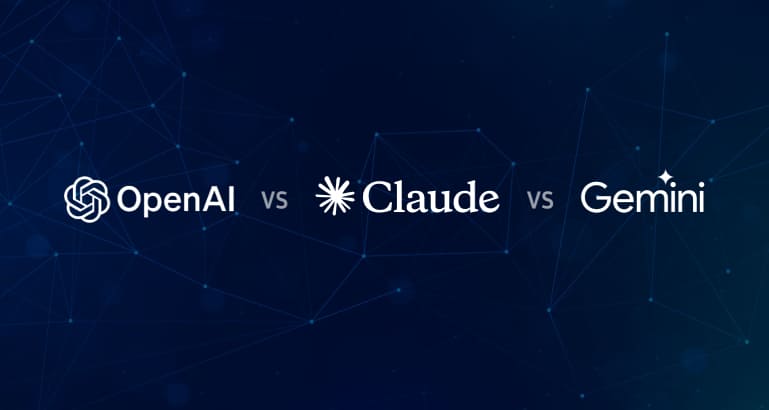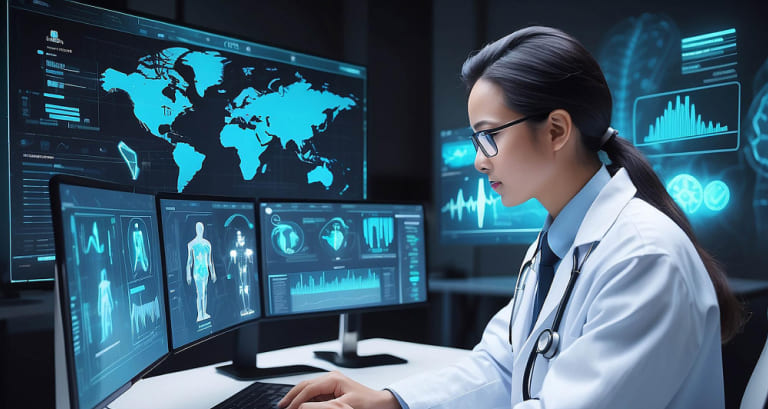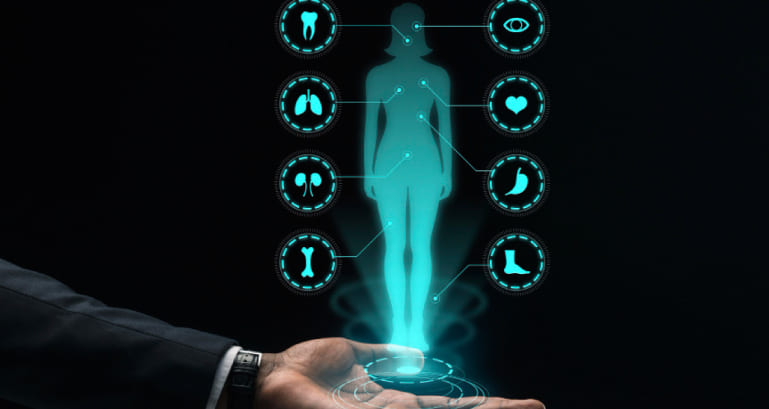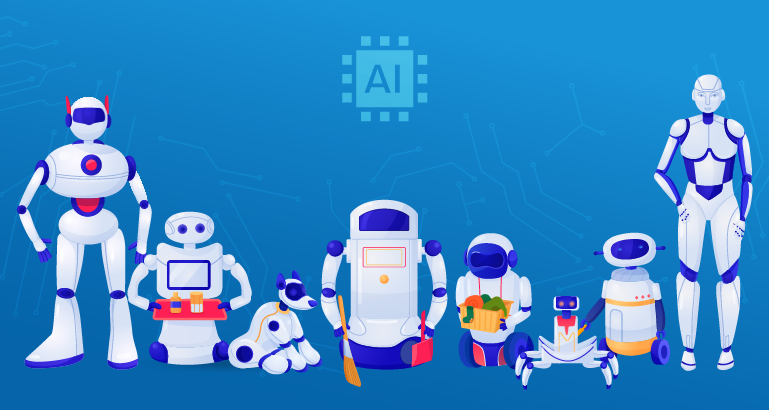AI In Heathcare
Introduction
Generative AI has created a new era of possibilities across various domains and industries. This constantly evolving technology has the potential to reshape our approach to complex problems, providing transformative solutions and innovative outcomes that were once inconceivable. With its ability to generate, simulate, and optimize, generative AI opens up new horizons and propels us into a realm of boundless potential.
The healthcare landscape is on the verge of transformative progress, driven by the rise of generative AI. As sophisticated machine learning algorithms evolve, they are reshaping multiple aspects of the healthcare industry, surpassing the confines of conventional methods. Generative AI is set to revolutionize how healthcare professionals tackle intricate medical challenges, from diagnosis and treatment to drug discovery and personalized medicine. By harnessing the capabilities of generative AI, the healthcare industry is poised to witness remarkable advancements that have the potential to improve patient outcomes, enhance medical research, and reshape the entire healthcare landscape.
Generative AI
Generative AI, also known as generative artificial intelligence, is a specialized field of AI that focuses on developing models capable of creating fresh and innovative content. Unlike conventional AI models that rely on predefined rules and patterns, generative AI models can learn from existing data and produce novel outputs that resemble the characteristics of the data they were trained on. At the heart of generative AI lies the concept of generative models. These models are designed to discern the underlying patterns and structures within a dataset and leverage that knowledge to generate new instances that closely resemble the original data. Generative models are trained using extensive datasets and employ probabilistic techniques to capture the distribution of the training data.
Generative AI models find diverse applications, including image synthesis, text generation, music composition, and even video generation. These models possess the remarkable ability to produce fresh and distinctive content that embodies the traits and style of the training data. Importantly, generative AI models are not merely duplicating existing data; instead, they are learning the underlying patterns and structures to generate entirely novel outputs.
Generative AI in Healthcare
Generative AI finds application in healthcare by utilizing techniques and models of generative artificial intelligence across multiple facets of the healthcare industry. Through the implementation of machine learning algorithms, it generates novel and pertinent content specific to healthcare, encompassing medical images, personalized treatment plans, and other relevant areas.
Advantages of AI in healthcare
- By automating repetitive tasks, Generative AI streamlines healthcare processes, such as data entry, administrative tasks, and image analysis. This automation frees up valuable time for healthcare professionals, allowing them to focus on more complex and critical aspects of patient care.
- Generative AI optimizes workflows, intelligently allocating resources and prioritizing tasks, leading to more efficient operations, cost reduction, and increased patient satisfaction.
- Generative AI models help reduce human errors and biases inherent in healthcare. Properly trained and validated AI systems provide objective and consistent analysis, mitigating the impact of human biases. They offer more accurate predictions and diagnoses by analyzing extensive patient data, including medical records, genetics, and environmental factors. This enables personalized treatment plans, early risk detection, and improved disease progression predictions.
- Generative AI contributes to medical education by creating realistic virtual simulations and training scenarios. Healthcare professionals can practice a wide range of medical conditions and procedures in a safe and controlled environment, without jeopardizing patient safety.
- Additionally, Generative AI generates synthetic medical data, offering access to diverse case studies and expert knowledge. This allows healthcare professionals to enhance their skills, learn from specialists, and gain expertise in specialized areas that may be limited in real-world patient encounters.
Applications of AI in Healthcare
- Medical Imaging Generative AI techniques have found extensive applications in enhancing medical imaging analysis and diagnostics. Notably, models like DALL.E and Stable Diffusion have proven effective for this purpose.
Let's explore the impact of generative AI in medical imaging:
- Improved diagnostic accuracy: Generative models, such as Generative Adversarial Networks (GANs), can create synthetic medical images that closely resemble real patient images. This aids in training models to achieve higher accuracy in diagnosing diseases, such as cancer or abnormalities in MRI or CT scans.
- Faster and more precise image analysis: Generative AI automates image analysis tasks like segmentation, lesion detection, or organ identification. Leveraging generative models enables quicker and more precise image processing, reducing the workload on radiologists and enhancing overall efficiency.
- Drug Discovery and Development Generative AI techniques have the potential to revolutionize the drug discovery and development process, leading to more efficient pipelines.
- Accelerated identification of potential drug candidates: Generative models can generate novel molecules with desired properties, helping researchers explore the vast chemical space efficiently. These generated molecules can then be further analyzed for drug-like properties, potentially leading to the discovery of new drug candidates.
- Optimization of drug formulations and dosages: Generative AI assists in optimizing drug formulations and dosages by simulating interactions between drugs and the human body. This allows for personalized medicine, tailoring treatments based on individual patient characteristics and improving therapeutic outcomes.
- Personalized Medicine Generative AI plays a crucial role in advancing personalized medicine, aiming to provide tailored treatment plans based on individual patient data.
- Tailored treatment plans: Generative models analyze patient data, including genetic information, medical history, and clinical data, to generate personalized treatment plans. This aids in selecting the most effective therapies and predicting individual patient responses.
- Predictive analytics for disease progression and treatment response: Generative AI analyzes large datasets and integrates various patient factors to generate predictive models that estimate disease progression and treatment outcomes. This empowers healthcare professionals to make informed decisions regarding treatment strategies and optimize patient care.
- Medical research and data analysis Generative AI techniques hold immense potential in medical research and data analysis, offering advantages like extracting insights from large datasets and privacy-preserving research with synthetic data. Generative models can analyze extensive medical data, such as electronic health records, research papers, and clinical trials, to unveil valuable insights and discover patterns that may lead to medical breakthroughs or novel discoveries. To address privacy concerns, generative AI can create synthetic medical data that closely resembles real patient data while safeguarding individual privacy. This synthetic data can be used for research purposes without compromising sensitive patient information.
- Clinical decision-making processes Generative AI has significant potential to enhance clinical decision-making processes and support healthcare professionals in making precise and informed diagnoses. Solutions like Glass. Health demonstrates this capability by analyzing vast amounts of patient data, including medical records, lab results, previous treatments, and medical imaging (e.g., MRIs and X-rays). Generative AI algorithms can identify intricate patterns and correlations that might escape human clinicians' notice.
Population health management
Generative AI in healthcare can greatly enhance population health management strategies. Policymakers can access detailed demographic information using generative AI, enabling deeper insights into specific populations' health profiles and requirements. They can analyze large datasets to identify patterns, trends, and disparities within these populations. This level of granularity enables the design and implementation of targeted public health initiatives, including preventive measures and early intervention programs that address the unique challenges faced by underserved communities. By understanding specific health needs and social determinants of health affecting different populations, policymakers can allocate resources more efficiently to improve population health outcomes effectively.
Conclusion
The emergence of generative AI has ushered in a transformative era with abundant possibilities in the healthcare industry. Its capacity to generate new data, enhance diagnostics, optimize treatment approaches, and accelerate drug discovery is revolutionizing healthcare practices. From improving medical imaging and patient care to facilitating personalized medicine and streamlining drug development, this powerful technology offers immense potential for elevating healthcare outcomes. As we continue to harness the potential of generative AI and address its challenges, we stand on the brink of witnessing a new era of innovation and breakthroughs in the field of healthcare. By partnering with Nu10 Technologies, you can develop robust generative AI solutions tailored to your specific healthcare business needs, ensuring that you remain at the forefront of technological advancements to deliver improved healthcare services.
About Author
Dr. Phaneender Aedla
Dr. Phaneender Aedla has over 24 years of experience in handling and managing petabyte-scale data systems. He blends deep technical acumen with strategic vision, and aims to drive intelligent, sustainable innovation through co-creative partnerships that unlock true business value.








